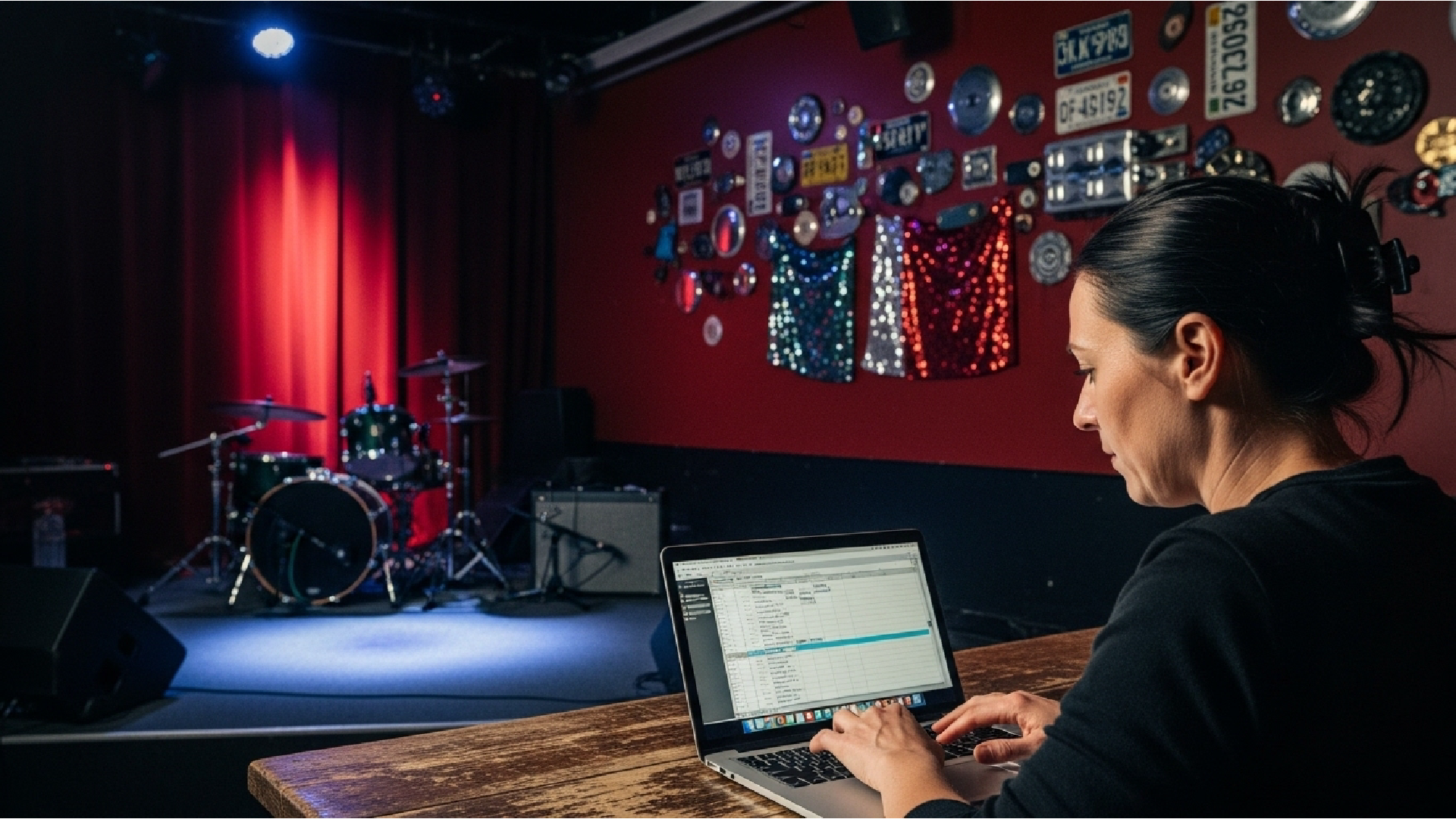


Get exclusive resources, gig management tips, and tools straight to your inbox.
How much is it costing you?
For many small and mid-sized venues, every gig feels like a balancing act.
You’re doing everything right, booking great acts, creating events that your audience loves, but the numbers still don’t quite add up. Rising costs, unpredictable crowds, and staff overheads make it harder than ever to turn a decent profit.
I’ve been there myself. As someone who’s owned a grass roots venue, and worked across hundreds of shows, I know what it’s like to finish a busy weekend and still wonder where the money went.
This article is for venue owners and managers who want to increase profitability without hiking ticket prices. You’ll learn where most venues lose money, which operational changes have the biggest impact, and how to track profit per event, even with a small team or no team at all.
The live music landscape is under pressure. According to WeWillThrive, 125 UK grassroots venues stopped live programming in 2023. Rent, energy costs, and staffing all went up faster than ticket revenue. At the same time, audiences are more selective. Cost of living pressures mean fewer people are attending midweek gigs, and bars are seeing lower per-head spending.
For many venues, the problem isn’t that revenue has disappeared, it’s that expenses have crept up quietly while admin and complexity have exploded. Each event involves more moving parts, more communication channels, and more potential for error.
When we talk about venue profitability, we often focus on big-ticket items like rent or licensing. But in practice, it’s the hidden costs that can eat away and do the most damage.
Here are three that come up repeatedly:
Late starts, extended soundchecks, or last-minute changes mean paying for extra hours that weren’t budgeted.
Outdated or unclear requirements from bands lead to confusion, delays and often additional unexpected costs when having to hire something in last minute.
Managing everything through email, WhatsApp, and spreadsheets burns hours every week, time that could be spent booking more events or promoting upcoming shows.
These costs don’t appear on invoices, but they erode your profit just the same.
Yes, and many are already doing it.
For small and mid-sized venues, raising prices can alienate your audience. Instead, the focus needs to shift toward operational efficiency and better communication. Every minute saved behind the scenes translates into real financial gain. The goal isn’t to cut corners, it’s to make sure every gig runs smoother, faster, and with fewer surprises.
Some venues are doing this by streamlining logistics and using centralised tools to manage bookings and communication. Others are using performance data to make smarter scheduling decisions and identify which nights actually generate profit.
The challenge has been that many smaller venues haven’t had access to these kinds of tools or they’ve simply been too expensive. That’s exactly why we built Stage Portal, our innovative approach has enabled us to build an all-in-one, easy-to-use platform that brings professional-level tools to venues of any size, at a price that is affordable.
You don’t need a massive overhaul to make meaningful improvements. The biggest wins often come from fixing simple process issues:
Standardise how you collect information such as riders, schedules, and contact details. Make sure all crew have access to the latest version in one shared place.
Even 30 minutes of crew time saved per event adds up over a year.
Use repeatable checklists for sound, lighting, and hospitality to prevent confusion or duplicated effort.
Tools that automatically update schedules, notify team members, or track changes eliminate costly human errors.
Many venues we speak to are not able to see easily which events make or lose money. That’s a serious problem. When data is scattered across spreadsheets and inboxes, it’s almost impossible to track profitability accurately. Venue managers often go on gut feel, not facts.
To change that, you need visibility into:
This doesn’t require a data analyst, just a clear system. That’s where gig management tools help. Tools such as Stage Portal allow you to capture event data in one place and through the reports you can see at a glance which nights are profitable and where margins are slipping. Over time, this insight allows you to plan better, cut waste, and grow sustainably.
Raising ticket prices isn’t the only way to grow revenue. In fact, most grassroots venues have untapped potential within their existing operations.
Here are a few proven strategies that we have used for our venues, events and festivals:
Focus on bar promotions, themed drinks, or timed discounts to increase per-head revenue.
Workshops, comedy nights, private functions, or rehearsal space hire can fill quieter nights.
Shared revenue on merch or bundled ticket offers benefits both sides.
VIP upgrades, early entry, or meet-and-greets for select shows can boost average revenue.
Long-term success isn’t just about cutting costs, it’s about building strong relationships that lead to consistent, repeat income.
Venues that communicate clearly, deliver reliable experiences, and make life easier for artists and promoters quickly become the go-to choice for bookings. That reputation travels fast and it directly impacts how often your venue gets chosen for tours and events.
Stronger partnerships also mean less friction, fewer last-minute problems, and more predictable revenue. When artists, managers, and promoters know they’re walking into a well-organised venue, they’re far more likely to return again and again.
With Stage Portal, venues can easily showcase what makes them stand out, from quality backline equipment to great green room facilities, helping them secure more bookings and build long-term relationships with touring acts and promoters.
If you want to increase profitability without raising ticket prices, the first step is to take a clear look at your current operations.
such as staff overtime, equipment hire, and the hours spent on admin each week.
understand how much profit each show actually delivers. This gives you a clear view of which events work best for your business.
Look for the points where communication breaks down most often or where teams lose the most time.
explore how gig management software can reduce manual work and improve visibility across your bookings, crew, and finances.
The Stage Portal platform makes this simple. It includes an expenses tracker and detailed reporting tools that let you compare costs and profits across individual events or over a chosen period, helping you make confident, data-driven decisions.
The live music industry isn’t an easy one, especially at the grassroots level. But small operational changes can have a huge impact on your bottom line.
By focusing on efficiency, improving communication, and tracking real data, you can build a more profitable venue, without asking your audience to pay more.
If you’re ready to reduce costs, streamline your workflow, and see exactly where your profits are going, either book a free Stage Portal demo today, or sign up for a 30 day free trial here.
Book a 30 minute demo and see how you can:
Discover the latest insights.